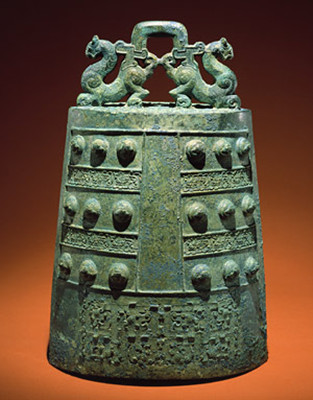Bells in China go back about five thousand years.
鐘在中國已有超過五千年的歷史。
The earliest would have been simple hand bells, with a clapper inside to produce the sound.
最早出現的應該是簡單的手鈴,內有鈴舌發聲。
Later the clapper was abandoned, and bronze bells were played by being hit on the outside with a hammer.
之后人們舍棄了鈴舌,改用槌子敲擊銅鐘外壁。
Our single bell would once have been part of a set of either nine or fourteen.
本文的銅鐘所屬的鐘組可能一套九口,也可能一套十四口。
Each would have been a different size, and would produce two different tones, depending on where it was struck.
每口大小不一,因敲擊部位的不同各能發出兩種不同的音調。
We asked the famous percussionist Evelyn Glennie to come and have a look at our bell, and to talk about the power of bells:
打擊樂手伊芙琳格倫尼女爵士十分了解銅鐘的魅力:
"Every single bell has its own unique sound.
每口鐘的聲音都獨一無二。
It can be a very tiny sound that you've really got to pay attention to, or it can just be a huge, huge resonant experience that a whole community can register.
可能是極細微、需要凝神靜聽的聲音, 也可能極為宏大響亮,整個社會都能共賞。
I remember in the early years when I went to China, and they had a whole rack of bells that decorated the back of the stage, and of course I couldn't help but go up to them and just admire the craftsmanship that went into this huge, huge structure.
我還記得早年我去中國演出的時候,他們擺了一整架的銅鐘作為舞臺背景的裝飾。
However, I did ask if I could possibly strike one, and I was given this long wooden pole, and of course the whole body has to be implemented in order to create a sound, and the right striking point is particularly important.
我情不自禁走上前去欣賞它們的工藝水平,并請求試敲一下。他們給了我一根長木槌,我用盡力氣才能讓鐘發出聲音:找準落槌點至關重要。
And I think there was this immense respect as to what actually I was going to do, you know.
敲擊前我心中充滿敬意。
It wasn't just a case of, Well, hit the bell, or something.
我并不是抱著隨便玩樂的心情,而是把它當作極為寶貴的機會。
This was something that I wanted to really treasure, and it was an incredible experience to just create that one strike, and then to really live the sound experience of the resonance after that strike had been made."
那過程十分美妙,之后我久久沉浸在鐘聲的回響之中。












